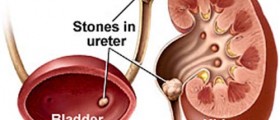
Kidney stones represent crystal collections that form inside the kidneys, to be more precise inside the renal pelvis. The minerals which are normally found in the urine may be present in excessive amounts and their accumulation eventually results in kidney stones. The kidneys are in charge with elimination of many substances and waste from the body. Many people are suffering from kidney stones without even knowing it. Smaller kidney stones are passed together with the urine with no accompanying symptoms. On the other hand, if kidney stones become large enough they are responsible for certain symptoms and signs and may be a cause of many complications.
Not all the kidney stones are made of the same mineral. There are several types of kidney stones and they include, calcium oxalate kidney stones, calcium phosphate kidney stones, struvit kidney stones, uric acid kidney stones and cystine kidney stones.
Calcium Oxalate and Calcium Phosphate Kidney Stones
The most common class of kidney stones is calcium oxalate kidney stones (they account for 80% of all kidney stones). They are made of the needle shaped crystals and their formation is generally associated with the food people eat or the water they drink. Furthermore the formation of calcium oxalate kidney stones may be connected with metabolic imbalances regarding calcium.
Calcium phosphate kidney stones are the second most common type of kidney stones and they develops as a consequence of many metabolic diseases (thyroid gland disorders, acidosis etc.).
Struvit Kidneys Stones
Struvit kidney stones are strongly related to urinary tract infection. The initiators of struvit kidney stones are bacteria which cause urinary tract infection. These stones develop due to the presence of urea-splitting bacteria which are found either in the blood or inside the kidneys.
Uric Acid Kidney Stones
Uric acid kidney stones develop as a consequence of improper function of kidneys. Uric acid kidney stones form due to too much uric acid in the urine or if the amount of uric acid is normal but there is too little urine. Furthermore, insoluble form of uric acid is more prone to accumulation and formation of kidney stones.
Cystine Kidney Stones
Cystine kidney stones represent a characteristic of a metabolic condition called cystinuria. In this condition the urine is acidic which induces development of crystals and subsequent formation of kidney stones. These kidney stones are considered a chronic problem and a patient may develop multiple stones over the years.













-Symptoms,-Diagnosis,-Treatment_f_280x120.jpg)



Your thoughts on this
Loading...